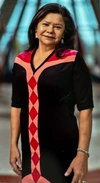From left to right: Tara Thompson, Chief Administrative Officer, Debbie Venne, Executive Administrative Officer, Karalan Francis, FNUniv 4th Year Business Student, Jacqueline Ottmann, President, Brenda Green, Senior Advisor, Partnerships and Development, Kristin Francis, Director, Communications.
A Q&A with Dr. Jacqueline Ottmann, President of First Nations University of Canada on the role Indigenous post-secondaries play in removing barriers faced by Indigenous women, creating better outcomes for everyone.
How is First Nations University of Canada working to address the biases and barriers Indigenous women face when accessing post-secondary education?
Answer:
Prior to colonization and the systemic subjugation of Indigenous women, they held prominent and elevated positions in our communities. Indigenous women were the heart of our communities as leaders, decision makers, influencers, teachers, water protectors, firekeepers, and keepers of law.
Despite what our people have faced, Indigenous women have remained steadfast in our knowledges and resilient in our power. Strong women are prevalent in our storytelling and evident in our communities today. We are a lifeforce that strengthens community. I am proud to share that these truths and teachings are shared at First Nations University of Canada (FNUniv). At FNUniv, 78% of the student population is female and many of our learners are mothers of large families. We actively work at inspiring, empowering, uplifting, and supporting women. This work takes many forms.
For example, through scholarships, bursaries, childcare, Elder and wellness support services, and other resources, we seek to support the financial, spiritual, and emotional aspects of well-being among students, in caring and holistic ways.
To provide some context, FNUniv has a history of influential women leaders. When FNUniv began as the Saskatchewan Indian Federated College (SIFC) in May of 1976, its first leader was Ida Wasacase, who was nêhiyaw (Cree). Ida, who was described as “strong in spirit,” was an activist, visionary, confident, and someone who leaned into nêhiyaw teachings for strength and wisdom. Later, Dr. Shauneen Pete (nêhiyaw, Dakota and Saulteaux) served as Vice President Academic and interim President at First Nations University of Canada. Dr. Pete is an engaging and accomplished storyteller, teacher, researcher, and mentor.
Today, after gaining valuable experience in two U15 universities, I have the privilege of serving First Nations University of Canada as President, an Anishinaabekwe from Fishing Lake First Nation. It’s so important to see Indigenous women making and taking space as leaders within educational institutions and elsewhere. Women in leadership positions are inherently role models for girls and other women; they present another face of leadership. Ultimately, we have a strong sense of purpose at FNUniv because, through our graduates, we are healing and re-building our Nations.
How are Indigenous post-secondaries leading transformative change?
Answer:
It is important to recognize that Indigenous youth are an incredible resource; a gift that will help ease the intellectual, skills, employment, and economic needs that are being experienced in many sectors.
Indigenous youth continue to be the fastest growing population in Canada. Because of this, Statistics Canada has projected that by 2041 (in 16 years) the Indigenous population could grow exponentially to 3.2 million people, up from 1.8 million people. When Indigenous youth are holistically supported from pre-K to post-secondary or trade school completion, and into the workforce, we all benefit.
Financially, this could translate to an annual contribution of $27.7 billion (at a minimum) to Canada’s GDP. Talent-wise, organizations benefit from the diverse perspectives that Indigenous people bring into the workplace. In relation to wellness and healing, employment brings a sense of purpose in the lives of Indigenous people, positively influencing families and communities, leading to economic prosperity and economic reconciliation.
Students in Indigenous-owned and -operated post-secondary institutions experience incredible success in program completion rates. In fact, 75–85% of students in Indigenous post-secondaries complete their studies compared to 55–75% at other institutions.
At FNUniv, we know the importance of the work we do. Our cause and our responsibility are significant. Personally, I have a sense of urgency to help improve the lives of Indigenous youth through a culturally strong, identity affirming, strength-based education. And we are seeing the impact firsthand.
I’m always impressed with the accomplishments of our students and alumni. They have impacted every sector in meaningful ways. We have tremendous potential. By embracing and welcoming Indigenous young people, our future will be nothing short of incredible.

Dr. Jacqueline Ottmann
Dr. Jacqueline Ottmann is Anishinaabe (Saulteaux) from Fishing Lake First Nation in Saskatchewan. Prior to her academic career, Jackie was an elementary, high school teacher, and principal. She remains an engaged scholar alongside her responsibilities as a senior academic leader. While at the University of Calgary, she was the Coordinator of the First Nations, Métis, Inuit undergraduate teacher education program, and Director of Indigenous Education Initiatives within the Werklund School of Education (WSE). She also co-chaired the WSE Indigenous Strategy, and alongside the Provost, the university-wide Indigenous Strategy.
During her time with the University of Saskatchewan as Professor and as the inaugural Vice-Provost Indigenous Engagement, Dr. Ottmann focused on impacting the university through systemic, organization-wide deep-seated change (e.g., data management policy inclusive of OCAP principles), and leading and completing the first-ever Indigenous strategy.
Dr. Jacqueline Ottmann was appointed President of the First Nations University of Canada on September 2021. Ottmann has been recognized as an international researcher, advocate, and change-maker whose purpose is to transform practices inclusive of Indigenous leadership, methodologies, and pedagogies. Jacqueline is driven to create schools and communities that foster a deeper sense of belonging and appreciation for Indigenous peoples – their histories, stories, ways of knowing and being. Ottmann is also the first Indigenous person to become President of the Canadian Society for the Study of Education.



